Clinical Depression: The Role of Culturally Safe Nursing Interventions
VerifiedAdded on 2023/06/11
|10
|2796
|347
Essay
AI Summary
This essay provides an in-depth analysis of clinical depression, a major depressive disorder with significant social and occupational impacts. It focuses on culturally safe nursing interventions and evidence-based psychoeducation strategies for improving the condition. The study summarizes various research findings, highlighting the importance of considering cultural beliefs and utilizing rehabilitation-based psychological approaches. It also discusses the role of cognitive behavioral interventions, mindfulness-based cognitive therapy, and other therapies in enhancing patient well-being and promoting functional healthcare goals for individuals with clinical depression. This resource provides an overview of effective interventions and their impact on patients' overall health and lifestyle.
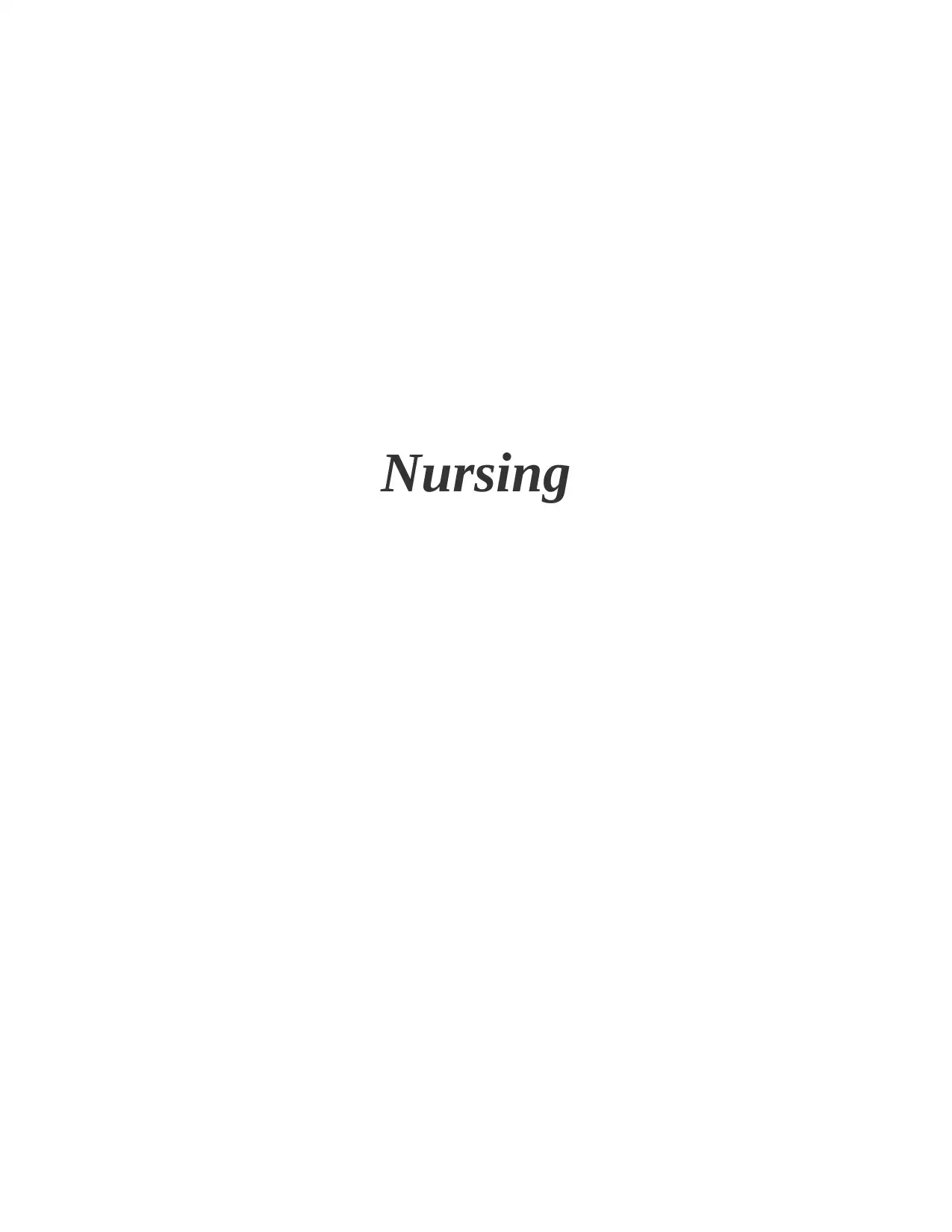
Nursing
Paraphrase This Document
Need a fresh take? Get an instant paraphrase of this document with our AI Paraphraser
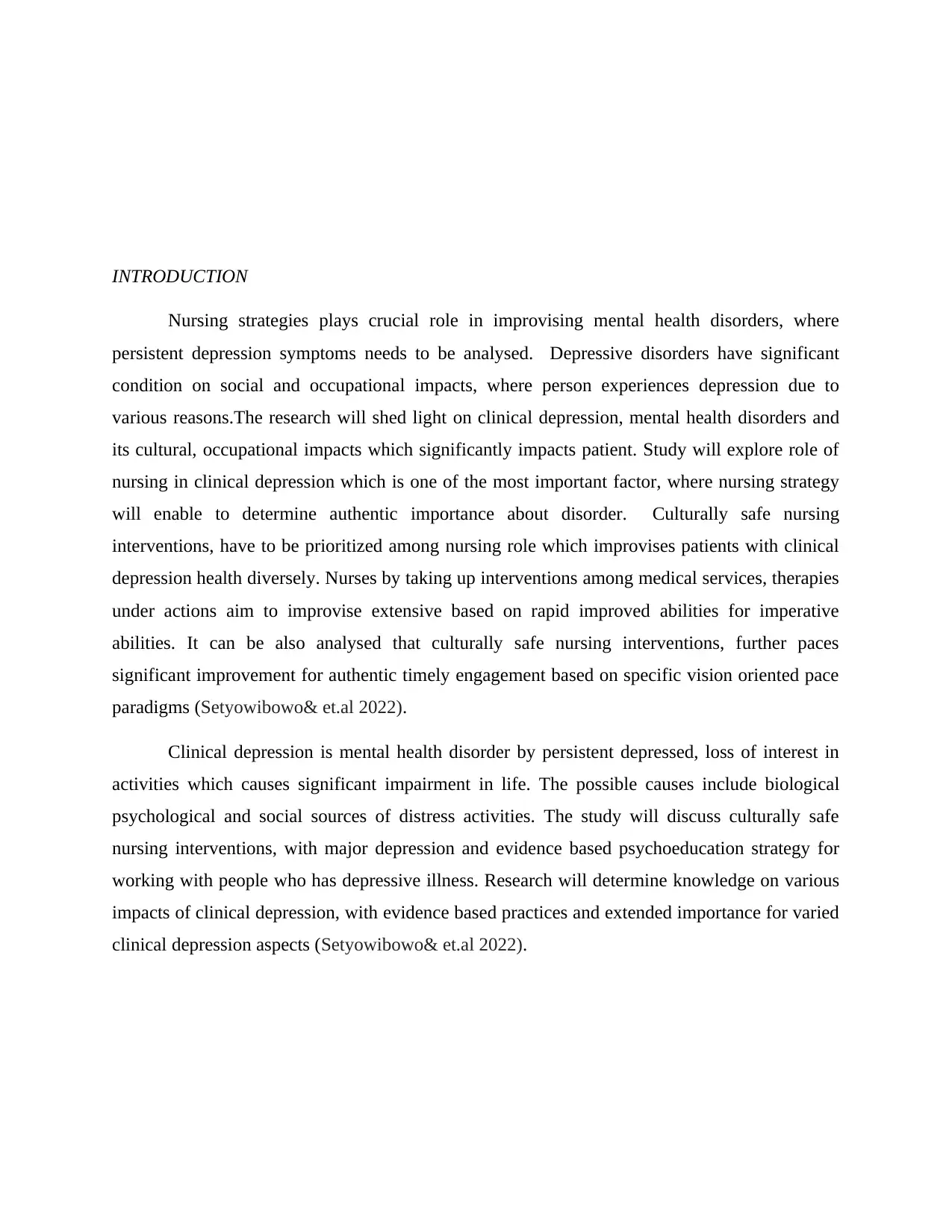
INTRODUCTION
Nursing strategies plays crucial role in improvising mental health disorders, where
persistent depression symptoms needs to be analysed. Depressive disorders have significant
condition on social and occupational impacts, where person experiences depression due to
various reasons.The research will shed light on clinical depression, mental health disorders and
its cultural, occupational impacts which significantly impacts patient. Study will explore role of
nursing in clinical depression which is one of the most important factor, where nursing strategy
will enable to determine authentic importance about disorder. Culturally safe nursing
interventions, have to be prioritized among nursing role which improvises patients with clinical
depression health diversely. Nurses by taking up interventions among medical services, therapies
under actions aim to improvise extensive based on rapid improved abilities for imperative
abilities. It can be also analysed that culturally safe nursing interventions, further paces
significant improvement for authentic timely engagement based on specific vision oriented pace
paradigms (Setyowibowo& et.al 2022).
Clinical depression is mental health disorder by persistent depressed, loss of interest in
activities which causes significant impairment in life. The possible causes include biological
psychological and social sources of distress activities. The study will discuss culturally safe
nursing interventions, with major depression and evidence based psychoeducation strategy for
working with people who has depressive illness. Research will determine knowledge on various
impacts of clinical depression, with evidence based practices and extended importance for varied
clinical depression aspects (Setyowibowo& et.al 2022).
Nursing strategies plays crucial role in improvising mental health disorders, where
persistent depression symptoms needs to be analysed. Depressive disorders have significant
condition on social and occupational impacts, where person experiences depression due to
various reasons.The research will shed light on clinical depression, mental health disorders and
its cultural, occupational impacts which significantly impacts patient. Study will explore role of
nursing in clinical depression which is one of the most important factor, where nursing strategy
will enable to determine authentic importance about disorder. Culturally safe nursing
interventions, have to be prioritized among nursing role which improvises patients with clinical
depression health diversely. Nurses by taking up interventions among medical services, therapies
under actions aim to improvise extensive based on rapid improved abilities for imperative
abilities. It can be also analysed that culturally safe nursing interventions, further paces
significant improvement for authentic timely engagement based on specific vision oriented pace
paradigms (Setyowibowo& et.al 2022).
Clinical depression is mental health disorder by persistent depressed, loss of interest in
activities which causes significant impairment in life. The possible causes include biological
psychological and social sources of distress activities. The study will discuss culturally safe
nursing interventions, with major depression and evidence based psychoeducation strategy for
working with people who has depressive illness. Research will determine knowledge on various
impacts of clinical depression, with evidence based practices and extended importance for varied
clinical depression aspects (Setyowibowo& et.al 2022).
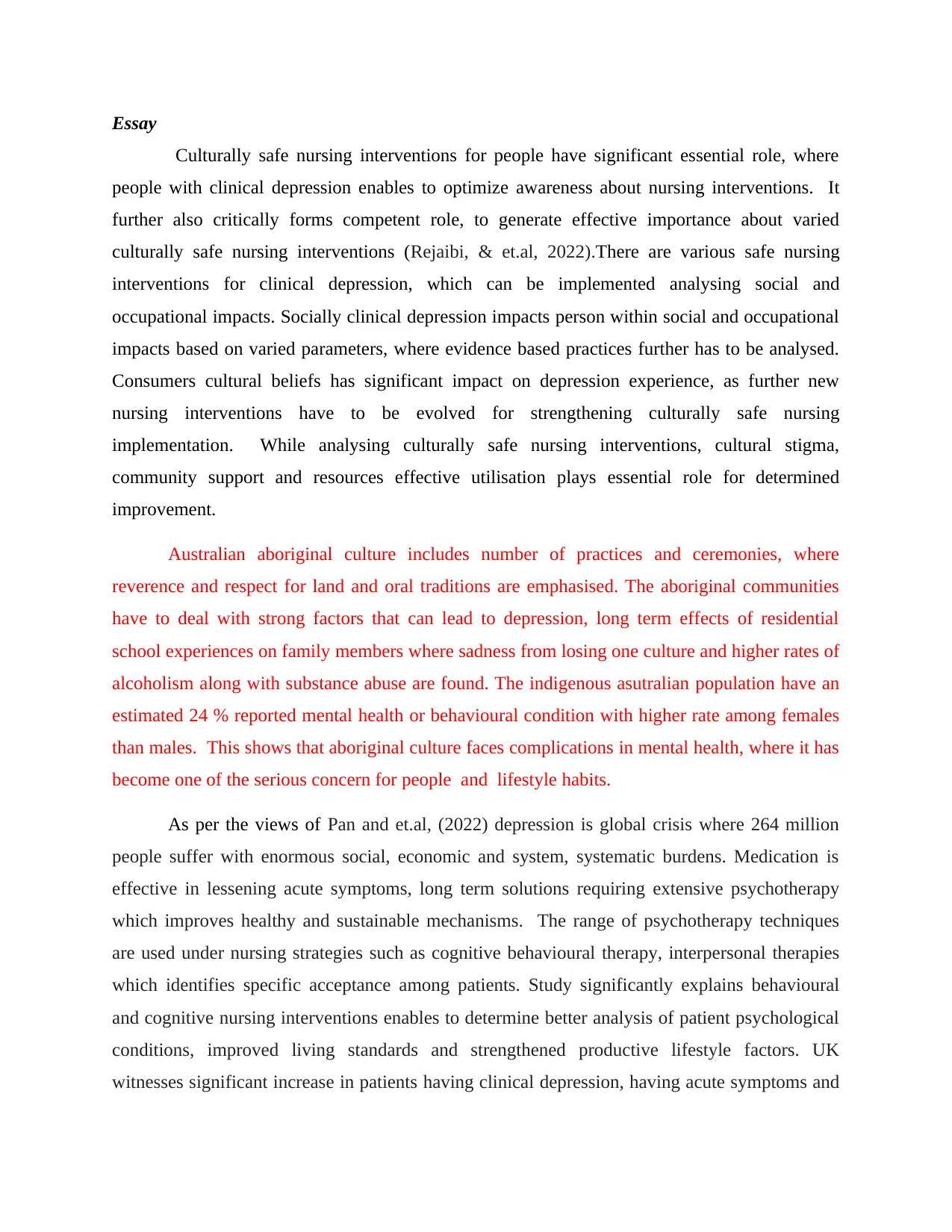
Essay
Culturally safe nursing interventions for people have significant essential role, where
people with clinical depression enables to optimize awareness about nursing interventions. It
further also critically forms competent role, to generate effective importance about varied
culturally safe nursing interventions (Rejaibi, & et.al, 2022).There are various safe nursing
interventions for clinical depression, which can be implemented analysing social and
occupational impacts. Socially clinical depression impacts person within social and occupational
impacts based on varied parameters, where evidence based practices further has to be analysed.
Consumers cultural beliefs has significant impact on depression experience, as further new
nursing interventions have to be evolved for strengthening culturally safe nursing
implementation. While analysing culturally safe nursing interventions, cultural stigma,
community support and resources effective utilisation plays essential role for determined
improvement.
Australian aboriginal culture includes number of practices and ceremonies, where
reverence and respect for land and oral traditions are emphasised. The aboriginal communities
have to deal with strong factors that can lead to depression, long term effects of residential
school experiences on family members where sadness from losing one culture and higher rates of
alcoholism along with substance abuse are found. The indigenous asutralian population have an
estimated 24 % reported mental health or behavioural condition with higher rate among females
than males. This shows that aboriginal culture faces complications in mental health, where it has
become one of the serious concern for people and lifestyle habits.
As per the views of Pan and et.al, (2022) depression is global crisis where 264 million
people suffer with enormous social, economic and system, systematic burdens. Medication is
effective in lessening acute symptoms, long term solutions requiring extensive psychotherapy
which improves healthy and sustainable mechanisms. The range of psychotherapy techniques
are used under nursing strategies such as cognitive behavioural therapy, interpersonal therapies
which identifies specific acceptance among patients. Study significantly explains behavioural
and cognitive nursing interventions enables to determine better analysis of patient psychological
conditions, improved living standards and strengthened productive lifestyle factors. UK
witnesses significant increase in patients having clinical depression, having acute symptoms and
Culturally safe nursing interventions for people have significant essential role, where
people with clinical depression enables to optimize awareness about nursing interventions. It
further also critically forms competent role, to generate effective importance about varied
culturally safe nursing interventions (Rejaibi, & et.al, 2022).There are various safe nursing
interventions for clinical depression, which can be implemented analysing social and
occupational impacts. Socially clinical depression impacts person within social and occupational
impacts based on varied parameters, where evidence based practices further has to be analysed.
Consumers cultural beliefs has significant impact on depression experience, as further new
nursing interventions have to be evolved for strengthening culturally safe nursing
implementation. While analysing culturally safe nursing interventions, cultural stigma,
community support and resources effective utilisation plays essential role for determined
improvement.
Australian aboriginal culture includes number of practices and ceremonies, where
reverence and respect for land and oral traditions are emphasised. The aboriginal communities
have to deal with strong factors that can lead to depression, long term effects of residential
school experiences on family members where sadness from losing one culture and higher rates of
alcoholism along with substance abuse are found. The indigenous asutralian population have an
estimated 24 % reported mental health or behavioural condition with higher rate among females
than males. This shows that aboriginal culture faces complications in mental health, where it has
become one of the serious concern for people and lifestyle habits.
As per the views of Pan and et.al, (2022) depression is global crisis where 264 million
people suffer with enormous social, economic and system, systematic burdens. Medication is
effective in lessening acute symptoms, long term solutions requiring extensive psychotherapy
which improves healthy and sustainable mechanisms. The range of psychotherapy techniques
are used under nursing strategies such as cognitive behavioural therapy, interpersonal therapies
which identifies specific acceptance among patients. Study significantly explains behavioural
and cognitive nursing interventions enables to determine better analysis of patient psychological
conditions, improved living standards and strengthened productive lifestyle factors. UK
witnesses significant increase in patients having clinical depression, having acute symptoms and
⊘ This is a preview!⊘
Do you want full access?
Subscribe today to unlock all pages.

Trusted by 1+ million students worldwide
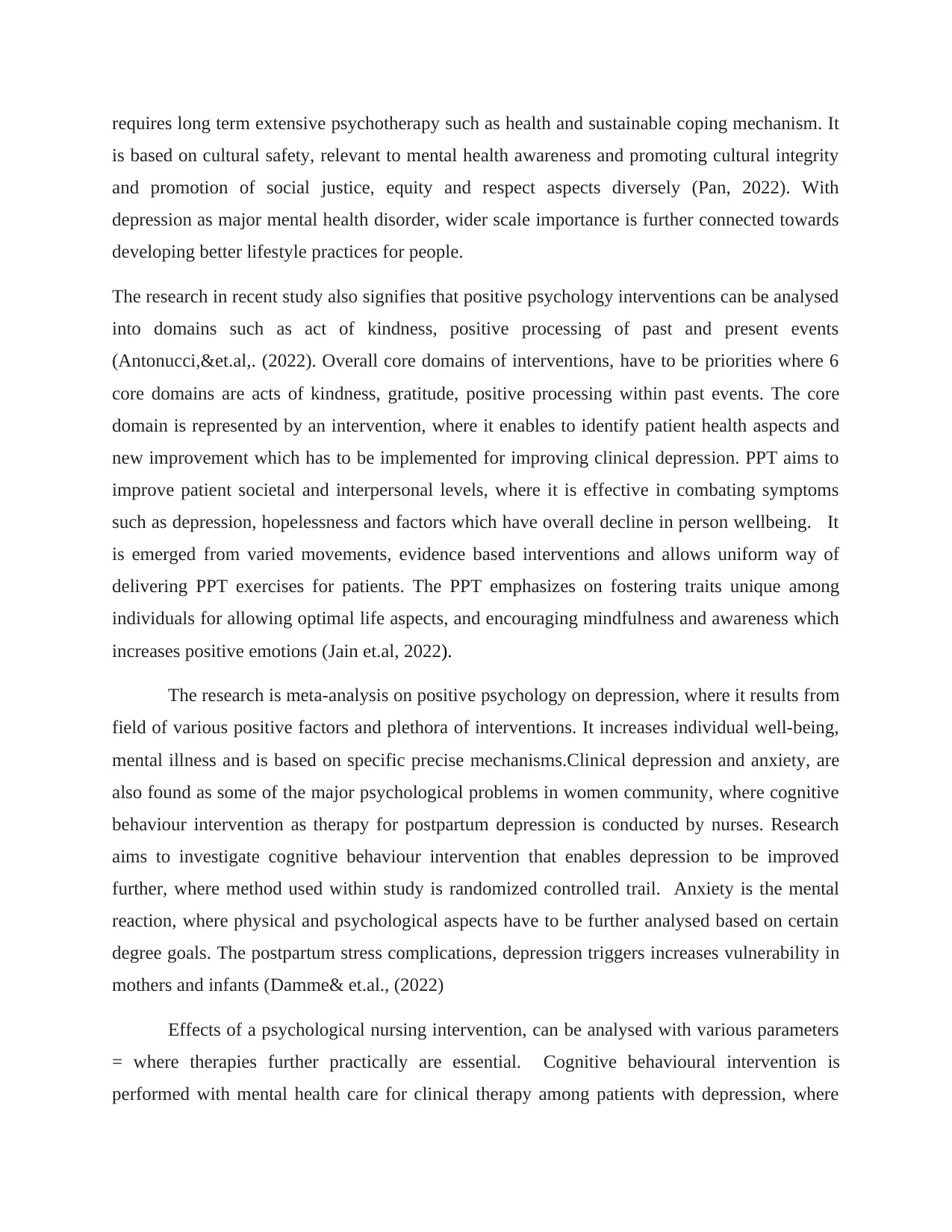
requires long term extensive psychotherapy such as health and sustainable coping mechanism. It
is based on cultural safety, relevant to mental health awareness and promoting cultural integrity
and promotion of social justice, equity and respect aspects diversely (Pan, 2022). With
depression as major mental health disorder, wider scale importance is further connected towards
developing better lifestyle practices for people.
The research in recent study also signifies that positive psychology interventions can be analysed
into domains such as act of kindness, positive processing of past and present events
(Antonucci,&et.al,. (2022). Overall core domains of interventions, have to be priorities where 6
core domains are acts of kindness, gratitude, positive processing within past events. The core
domain is represented by an intervention, where it enables to identify patient health aspects and
new improvement which has to be implemented for improving clinical depression. PPT aims to
improve patient societal and interpersonal levels, where it is effective in combating symptoms
such as depression, hopelessness and factors which have overall decline in person wellbeing. It
is emerged from varied movements, evidence based interventions and allows uniform way of
delivering PPT exercises for patients. The PPT emphasizes on fostering traits unique among
individuals for allowing optimal life aspects, and encouraging mindfulness and awareness which
increases positive emotions (Jain et.al, 2022).
The research is meta-analysis on positive psychology on depression, where it results from
field of various positive factors and plethora of interventions. It increases individual well-being,
mental illness and is based on specific precise mechanisms.Clinical depression and anxiety, are
also found as some of the major psychological problems in women community, where cognitive
behaviour intervention as therapy for postpartum depression is conducted by nurses. Research
aims to investigate cognitive behaviour intervention that enables depression to be improved
further, where method used within study is randomized controlled trail. Anxiety is the mental
reaction, where physical and psychological aspects have to be further analysed based on certain
degree goals. The postpartum stress complications, depression triggers increases vulnerability in
mothers and infants (Damme& et.al., (2022)
Effects of a psychological nursing intervention, can be analysed with various parameters
= where therapies further practically are essential. Cognitive behavioural intervention is
performed with mental health care for clinical therapy among patients with depression, where
is based on cultural safety, relevant to mental health awareness and promoting cultural integrity
and promotion of social justice, equity and respect aspects diversely (Pan, 2022). With
depression as major mental health disorder, wider scale importance is further connected towards
developing better lifestyle practices for people.
The research in recent study also signifies that positive psychology interventions can be analysed
into domains such as act of kindness, positive processing of past and present events
(Antonucci,&et.al,. (2022). Overall core domains of interventions, have to be priorities where 6
core domains are acts of kindness, gratitude, positive processing within past events. The core
domain is represented by an intervention, where it enables to identify patient health aspects and
new improvement which has to be implemented for improving clinical depression. PPT aims to
improve patient societal and interpersonal levels, where it is effective in combating symptoms
such as depression, hopelessness and factors which have overall decline in person wellbeing. It
is emerged from varied movements, evidence based interventions and allows uniform way of
delivering PPT exercises for patients. The PPT emphasizes on fostering traits unique among
individuals for allowing optimal life aspects, and encouraging mindfulness and awareness which
increases positive emotions (Jain et.al, 2022).
The research is meta-analysis on positive psychology on depression, where it results from
field of various positive factors and plethora of interventions. It increases individual well-being,
mental illness and is based on specific precise mechanisms.Clinical depression and anxiety, are
also found as some of the major psychological problems in women community, where cognitive
behaviour intervention as therapy for postpartum depression is conducted by nurses. Research
aims to investigate cognitive behaviour intervention that enables depression to be improved
further, where method used within study is randomized controlled trail. Anxiety is the mental
reaction, where physical and psychological aspects have to be further analysed based on certain
degree goals. The postpartum stress complications, depression triggers increases vulnerability in
mothers and infants (Damme& et.al., (2022)
Effects of a psychological nursing intervention, can be analysed with various parameters
= where therapies further practically are essential. Cognitive behavioural intervention is
performed with mental health care for clinical therapy among patients with depression, where
Paraphrase This Document
Need a fresh take? Get an instant paraphrase of this document with our AI Paraphraser
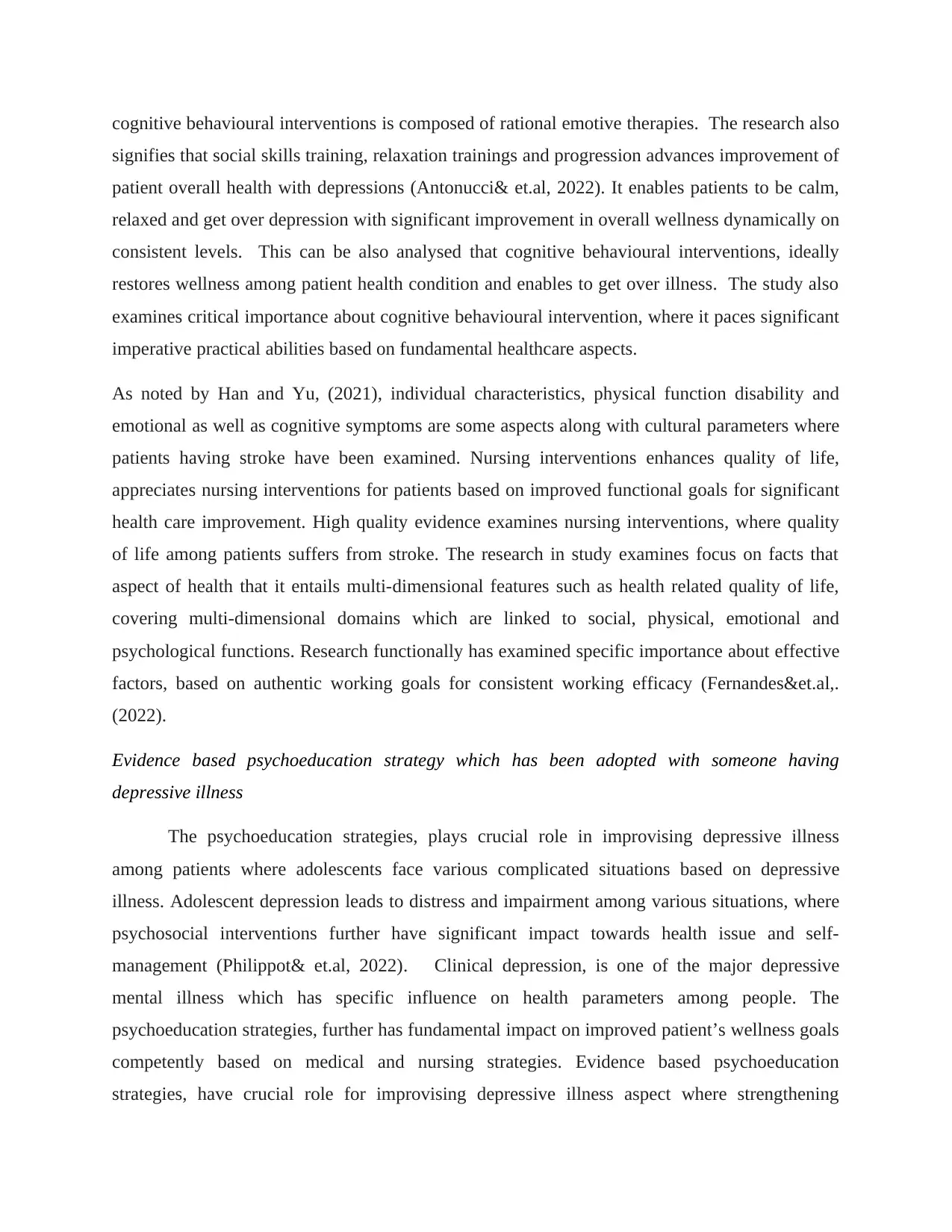
cognitive behavioural interventions is composed of rational emotive therapies. The research also
signifies that social skills training, relaxation trainings and progression advances improvement of
patient overall health with depressions (Antonucci& et.al, 2022). It enables patients to be calm,
relaxed and get over depression with significant improvement in overall wellness dynamically on
consistent levels. This can be also analysed that cognitive behavioural interventions, ideally
restores wellness among patient health condition and enables to get over illness. The study also
examines critical importance about cognitive behavioural intervention, where it paces significant
imperative practical abilities based on fundamental healthcare aspects.
As noted by Han and Yu, (2021), individual characteristics, physical function disability and
emotional as well as cognitive symptoms are some aspects along with cultural parameters where
patients having stroke have been examined. Nursing interventions enhances quality of life,
appreciates nursing interventions for patients based on improved functional goals for significant
health care improvement. High quality evidence examines nursing interventions, where quality
of life among patients suffers from stroke. The research in study examines focus on facts that
aspect of health that it entails multi-dimensional features such as health related quality of life,
covering multi-dimensional domains which are linked to social, physical, emotional and
psychological functions. Research functionally has examined specific importance about effective
factors, based on authentic working goals for consistent working efficacy (Fernandes&et.al,.
(2022).
Evidence based psychoeducation strategy which has been adopted with someone having
depressive illness
The psychoeducation strategies, plays crucial role in improvising depressive illness
among patients where adolescents face various complicated situations based on depressive
illness. Adolescent depression leads to distress and impairment among various situations, where
psychosocial interventions further have significant impact towards health issue and self-
management (Philippot& et.al, 2022). Clinical depression, is one of the major depressive
mental illness which has specific influence on health parameters among people. The
psychoeducation strategies, further has fundamental impact on improved patient’s wellness goals
competently based on medical and nursing strategies. Evidence based psychoeducation
strategies, have crucial role for improvising depressive illness aspect where strengthening
signifies that social skills training, relaxation trainings and progression advances improvement of
patient overall health with depressions (Antonucci& et.al, 2022). It enables patients to be calm,
relaxed and get over depression with significant improvement in overall wellness dynamically on
consistent levels. This can be also analysed that cognitive behavioural interventions, ideally
restores wellness among patient health condition and enables to get over illness. The study also
examines critical importance about cognitive behavioural intervention, where it paces significant
imperative practical abilities based on fundamental healthcare aspects.
As noted by Han and Yu, (2021), individual characteristics, physical function disability and
emotional as well as cognitive symptoms are some aspects along with cultural parameters where
patients having stroke have been examined. Nursing interventions enhances quality of life,
appreciates nursing interventions for patients based on improved functional goals for significant
health care improvement. High quality evidence examines nursing interventions, where quality
of life among patients suffers from stroke. The research in study examines focus on facts that
aspect of health that it entails multi-dimensional features such as health related quality of life,
covering multi-dimensional domains which are linked to social, physical, emotional and
psychological functions. Research functionally has examined specific importance about effective
factors, based on authentic working goals for consistent working efficacy (Fernandes&et.al,.
(2022).
Evidence based psychoeducation strategy which has been adopted with someone having
depressive illness
The psychoeducation strategies, plays crucial role in improvising depressive illness
among patients where adolescents face various complicated situations based on depressive
illness. Adolescent depression leads to distress and impairment among various situations, where
psychosocial interventions further have significant impact towards health issue and self-
management (Philippot& et.al, 2022). Clinical depression, is one of the major depressive
mental illness which has specific influence on health parameters among people. The
psychoeducation strategies, further has fundamental impact on improved patient’s wellness goals
competently based on medical and nursing strategies. Evidence based psychoeducation
strategies, have crucial role for improvising depressive illness aspect where strengthening
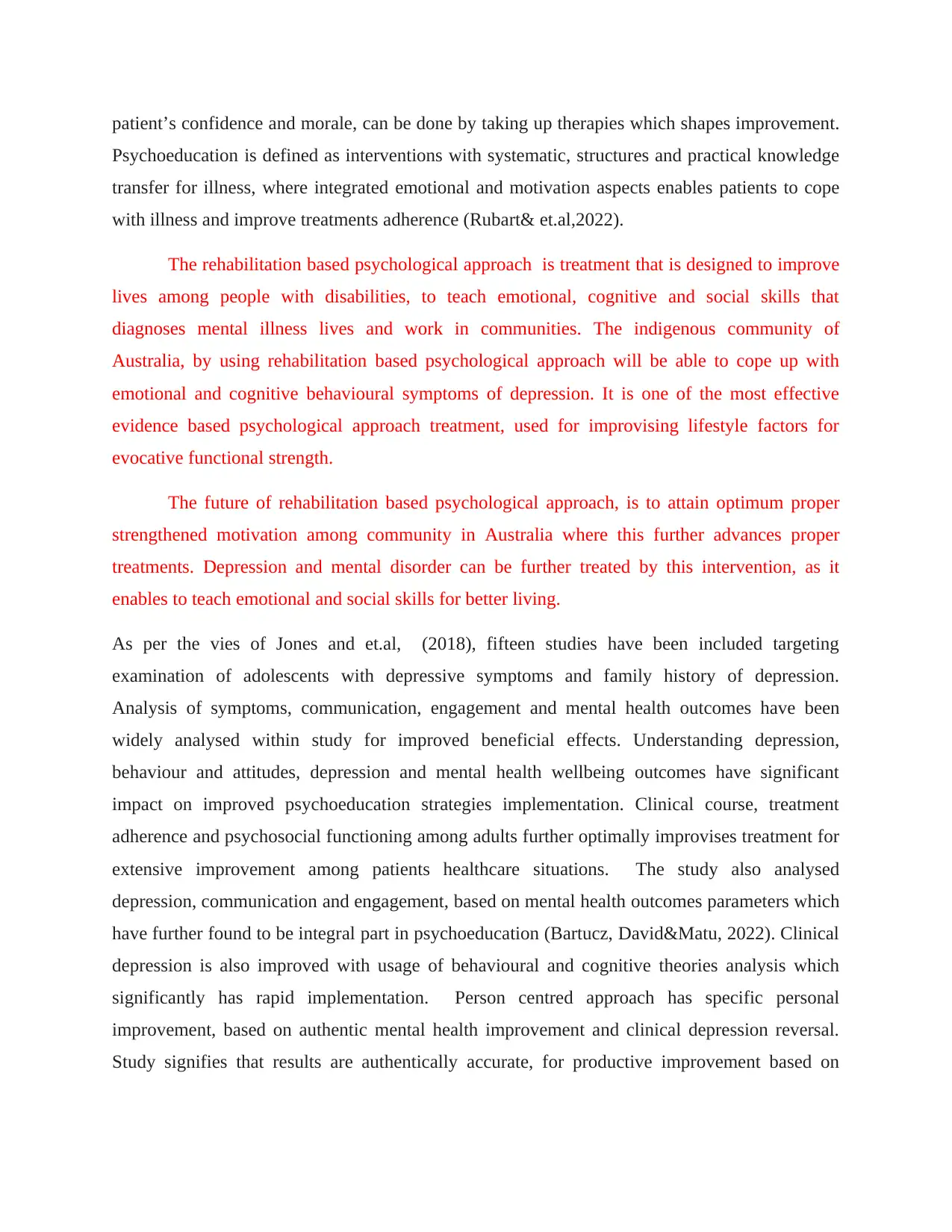
patient’s confidence and morale, can be done by taking up therapies which shapes improvement.
Psychoeducation is defined as interventions with systematic, structures and practical knowledge
transfer for illness, where integrated emotional and motivation aspects enables patients to cope
with illness and improve treatments adherence (Rubart& et.al,2022).
The rehabilitation based psychological approach is treatment that is designed to improve
lives among people with disabilities, to teach emotional, cognitive and social skills that
diagnoses mental illness lives and work in communities. The indigenous community of
Australia, by using rehabilitation based psychological approach will be able to cope up with
emotional and cognitive behavioural symptoms of depression. It is one of the most effective
evidence based psychological approach treatment, used for improvising lifestyle factors for
evocative functional strength.
The future of rehabilitation based psychological approach, is to attain optimum proper
strengthened motivation among community in Australia where this further advances proper
treatments. Depression and mental disorder can be further treated by this intervention, as it
enables to teach emotional and social skills for better living.
As per the vies of Jones and et.al, (2018), fifteen studies have been included targeting
examination of adolescents with depressive symptoms and family history of depression.
Analysis of symptoms, communication, engagement and mental health outcomes have been
widely analysed within study for improved beneficial effects. Understanding depression,
behaviour and attitudes, depression and mental health wellbeing outcomes have significant
impact on improved psychoeducation strategies implementation. Clinical course, treatment
adherence and psychosocial functioning among adults further optimally improvises treatment for
extensive improvement among patients healthcare situations. The study also analysed
depression, communication and engagement, based on mental health outcomes parameters which
have further found to be integral part in psychoeducation (Bartucz, David&Matu, 2022). Clinical
depression is also improved with usage of behavioural and cognitive theories analysis which
significantly has rapid implementation. Person centred approach has specific personal
improvement, based on authentic mental health improvement and clinical depression reversal.
Study signifies that results are authentically accurate, for productive improvement based on
Psychoeducation is defined as interventions with systematic, structures and practical knowledge
transfer for illness, where integrated emotional and motivation aspects enables patients to cope
with illness and improve treatments adherence (Rubart& et.al,2022).
The rehabilitation based psychological approach is treatment that is designed to improve
lives among people with disabilities, to teach emotional, cognitive and social skills that
diagnoses mental illness lives and work in communities. The indigenous community of
Australia, by using rehabilitation based psychological approach will be able to cope up with
emotional and cognitive behavioural symptoms of depression. It is one of the most effective
evidence based psychological approach treatment, used for improvising lifestyle factors for
evocative functional strength.
The future of rehabilitation based psychological approach, is to attain optimum proper
strengthened motivation among community in Australia where this further advances proper
treatments. Depression and mental disorder can be further treated by this intervention, as it
enables to teach emotional and social skills for better living.
As per the vies of Jones and et.al, (2018), fifteen studies have been included targeting
examination of adolescents with depressive symptoms and family history of depression.
Analysis of symptoms, communication, engagement and mental health outcomes have been
widely analysed within study for improved beneficial effects. Understanding depression,
behaviour and attitudes, depression and mental health wellbeing outcomes have significant
impact on improved psychoeducation strategies implementation. Clinical course, treatment
adherence and psychosocial functioning among adults further optimally improvises treatment for
extensive improvement among patients healthcare situations. The study also analysed
depression, communication and engagement, based on mental health outcomes parameters which
have further found to be integral part in psychoeducation (Bartucz, David&Matu, 2022). Clinical
depression is also improved with usage of behavioural and cognitive theories analysis which
significantly has rapid implementation. Person centred approach has specific personal
improvement, based on authentic mental health improvement and clinical depression reversal.
Study signifies that results are authentically accurate, for productive improvement based on
⊘ This is a preview!⊘
Do you want full access?
Subscribe today to unlock all pages.

Trusted by 1+ million students worldwide
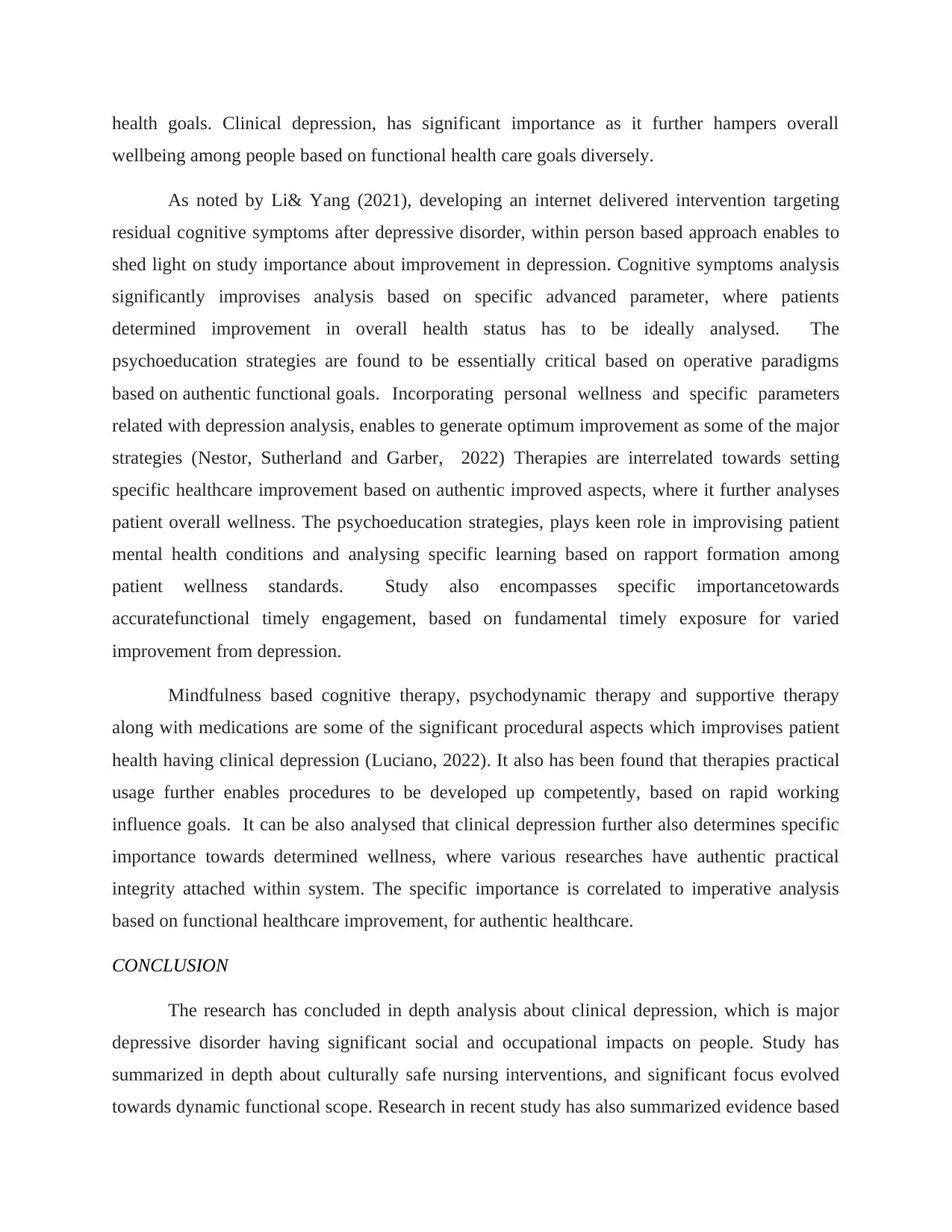
health goals. Clinical depression, has significant importance as it further hampers overall
wellbeing among people based on functional health care goals diversely.
As noted by Li& Yang (2021), developing an internet delivered intervention targeting
residual cognitive symptoms after depressive disorder, within person based approach enables to
shed light on study importance about improvement in depression. Cognitive symptoms analysis
significantly improvises analysis based on specific advanced parameter, where patients
determined improvement in overall health status has to be ideally analysed. The
psychoeducation strategies are found to be essentially critical based on operative paradigms
based on authentic functional goals. Incorporating personal wellness and specific parameters
related with depression analysis, enables to generate optimum improvement as some of the major
strategies (Nestor, Sutherland and Garber, 2022) Therapies are interrelated towards setting
specific healthcare improvement based on authentic improved aspects, where it further analyses
patient overall wellness. The psychoeducation strategies, plays keen role in improvising patient
mental health conditions and analysing specific learning based on rapport formation among
patient wellness standards. Study also encompasses specific importancetowards
accuratefunctional timely engagement, based on fundamental timely exposure for varied
improvement from depression.
Mindfulness based cognitive therapy, psychodynamic therapy and supportive therapy
along with medications are some of the significant procedural aspects which improvises patient
health having clinical depression (Luciano, 2022). It also has been found that therapies practical
usage further enables procedures to be developed up competently, based on rapid working
influence goals. It can be also analysed that clinical depression further also determines specific
importance towards determined wellness, where various researches have authentic practical
integrity attached within system. The specific importance is correlated to imperative analysis
based on functional healthcare improvement, for authentic healthcare.
CONCLUSION
The research has concluded in depth analysis about clinical depression, which is major
depressive disorder having significant social and occupational impacts on people. Study has
summarized in depth about culturally safe nursing interventions, and significant focus evolved
towards dynamic functional scope. Research in recent study has also summarized evidence based
wellbeing among people based on functional health care goals diversely.
As noted by Li& Yang (2021), developing an internet delivered intervention targeting
residual cognitive symptoms after depressive disorder, within person based approach enables to
shed light on study importance about improvement in depression. Cognitive symptoms analysis
significantly improvises analysis based on specific advanced parameter, where patients
determined improvement in overall health status has to be ideally analysed. The
psychoeducation strategies are found to be essentially critical based on operative paradigms
based on authentic functional goals. Incorporating personal wellness and specific parameters
related with depression analysis, enables to generate optimum improvement as some of the major
strategies (Nestor, Sutherland and Garber, 2022) Therapies are interrelated towards setting
specific healthcare improvement based on authentic improved aspects, where it further analyses
patient overall wellness. The psychoeducation strategies, plays keen role in improvising patient
mental health conditions and analysing specific learning based on rapport formation among
patient wellness standards. Study also encompasses specific importancetowards
accuratefunctional timely engagement, based on fundamental timely exposure for varied
improvement from depression.
Mindfulness based cognitive therapy, psychodynamic therapy and supportive therapy
along with medications are some of the significant procedural aspects which improvises patient
health having clinical depression (Luciano, 2022). It also has been found that therapies practical
usage further enables procedures to be developed up competently, based on rapid working
influence goals. It can be also analysed that clinical depression further also determines specific
importance towards determined wellness, where various researches have authentic practical
integrity attached within system. The specific importance is correlated to imperative analysis
based on functional healthcare improvement, for authentic healthcare.
CONCLUSION
The research has concluded in depth analysis about clinical depression, which is major
depressive disorder having significant social and occupational impacts on people. Study has
summarized in depth about culturally safe nursing interventions, and significant focus evolved
towards dynamic functional scope. Research in recent study has also summarized evidence based
Paraphrase This Document
Need a fresh take? Get an instant paraphrase of this document with our AI Paraphraser
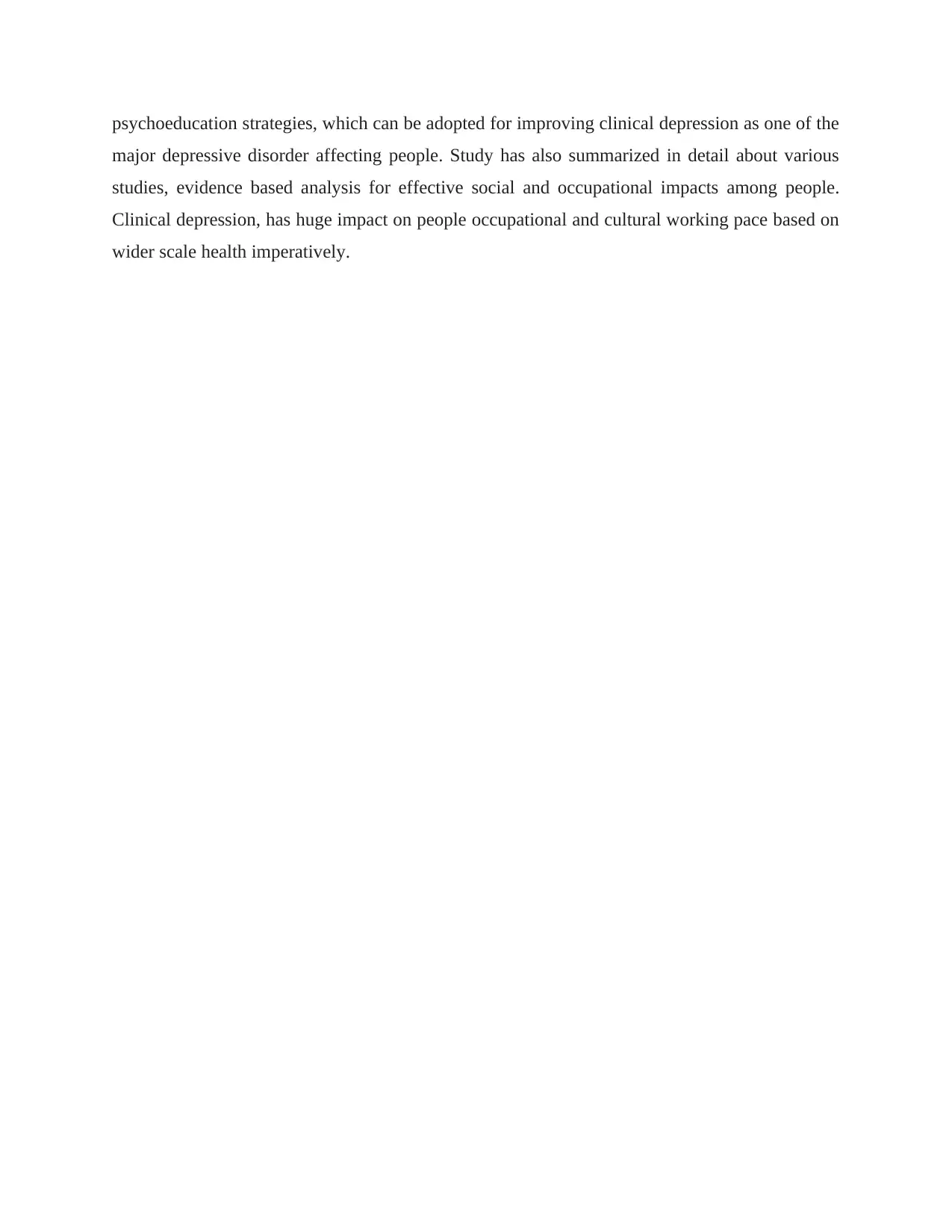
psychoeducation strategies, which can be adopted for improving clinical depression as one of the
major depressive disorder affecting people. Study has also summarized in detail about various
studies, evidence based analysis for effective social and occupational impacts among people.
Clinical depression, has huge impact on people occupational and cultural working pace based on
wider scale health imperatively.
major depressive disorder affecting people. Study has also summarized in detail about various
studies, evidence based analysis for effective social and occupational impacts among people.
Clinical depression, has huge impact on people occupational and cultural working pace based on
wider scale health imperatively.
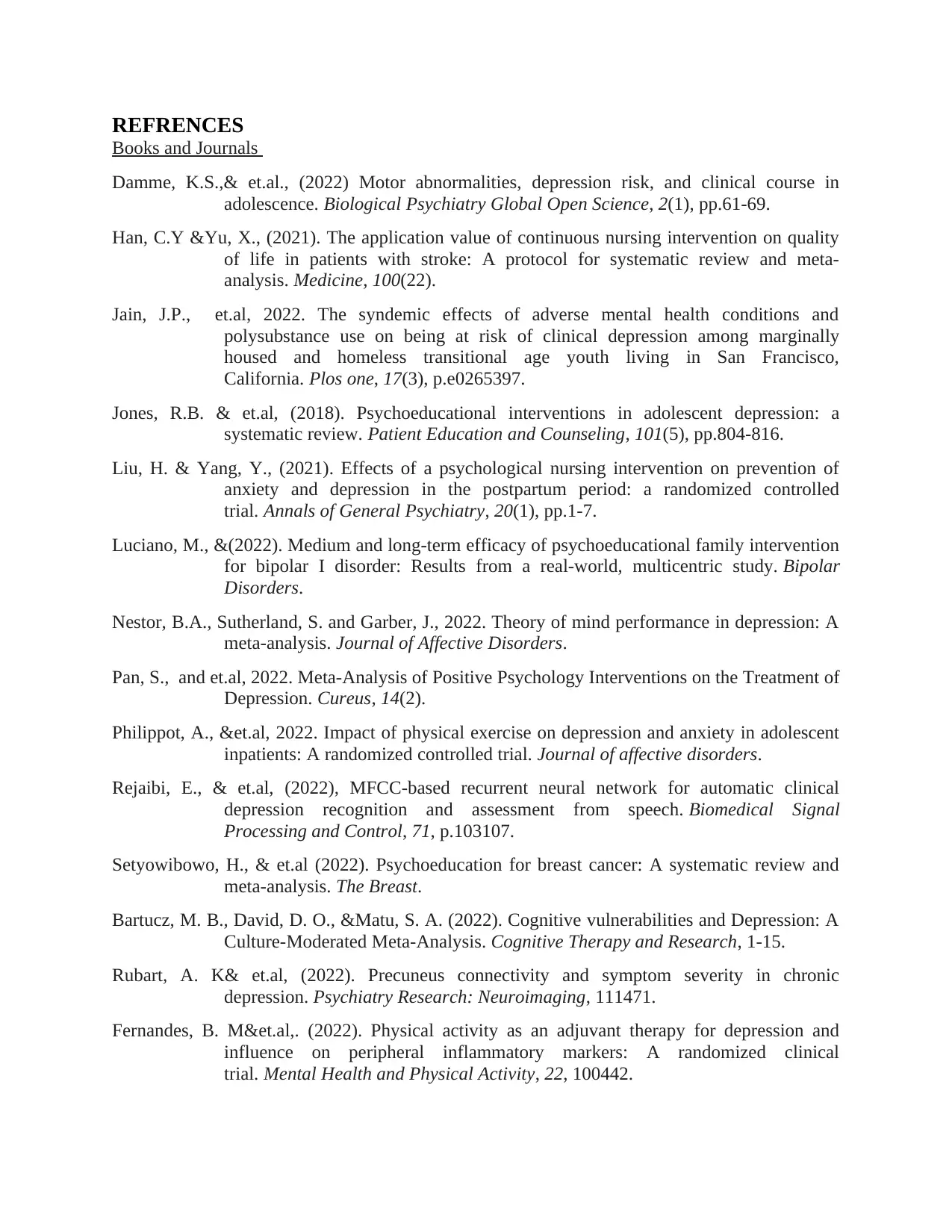
REFRENCES
Books and Journals
Damme, K.S.,& et.al., (2022) Motor abnormalities, depression risk, and clinical course in
adolescence. Biological Psychiatry Global Open Science, 2(1), pp.61-69.
Han, C.Y &Yu, X., (2021). The application value of continuous nursing intervention on quality
of life in patients with stroke: A protocol for systematic review and meta-
analysis. Medicine, 100(22).
Jain, J.P., et.al, 2022. The syndemic effects of adverse mental health conditions and
polysubstance use on being at risk of clinical depression among marginally
housed and homeless transitional age youth living in San Francisco,
California. Plos one, 17(3), p.e0265397.
Jones, R.B. & et.al, (2018). Psychoeducational interventions in adolescent depression: a
systematic review. Patient Education and Counseling, 101(5), pp.804-816.
Liu, H. & Yang, Y., (2021). Effects of a psychological nursing intervention on prevention of
anxiety and depression in the postpartum period: a randomized controlled
trial. Annals of General Psychiatry, 20(1), pp.1-7.
Luciano, M., &(2022). Medium and long‐term efficacy of psychoeducational family intervention
for bipolar I disorder: Results from a real‐world, multicentric study. Bipolar
Disorders.
Nestor, B.A., Sutherland, S. and Garber, J., 2022. Theory of mind performance in depression: A
meta-analysis. Journal of Affective Disorders.
Pan, S., and et.al, 2022. Meta-Analysis of Positive Psychology Interventions on the Treatment of
Depression. Cureus, 14(2).
Philippot, A., &et.al, 2022. Impact of physical exercise on depression and anxiety in adolescent
inpatients: A randomized controlled trial. Journal of affective disorders.
Rejaibi, E., & et.al, (2022), MFCC-based recurrent neural network for automatic clinical
depression recognition and assessment from speech. Biomedical Signal
Processing and Control, 71, p.103107.
Setyowibowo, H., & et.al (2022). Psychoeducation for breast cancer: A systematic review and
meta-analysis. The Breast.
Bartucz, M. B., David, D. O., &Matu, S. A. (2022). Cognitive vulnerabilities and Depression: A
Culture-Moderated Meta-Analysis. Cognitive Therapy and Research, 1-15.
Rubart, A. K& et.al, (2022). Precuneus connectivity and symptom severity in chronic
depression. Psychiatry Research: Neuroimaging, 111471.
Fernandes, B. M&et.al,. (2022). Physical activity as an adjuvant therapy for depression and
influence on peripheral inflammatory markers: A randomized clinical
trial. Mental Health and Physical Activity, 22, 100442.
Books and Journals
Damme, K.S.,& et.al., (2022) Motor abnormalities, depression risk, and clinical course in
adolescence. Biological Psychiatry Global Open Science, 2(1), pp.61-69.
Han, C.Y &Yu, X., (2021). The application value of continuous nursing intervention on quality
of life in patients with stroke: A protocol for systematic review and meta-
analysis. Medicine, 100(22).
Jain, J.P., et.al, 2022. The syndemic effects of adverse mental health conditions and
polysubstance use on being at risk of clinical depression among marginally
housed and homeless transitional age youth living in San Francisco,
California. Plos one, 17(3), p.e0265397.
Jones, R.B. & et.al, (2018). Psychoeducational interventions in adolescent depression: a
systematic review. Patient Education and Counseling, 101(5), pp.804-816.
Liu, H. & Yang, Y., (2021). Effects of a psychological nursing intervention on prevention of
anxiety and depression in the postpartum period: a randomized controlled
trial. Annals of General Psychiatry, 20(1), pp.1-7.
Luciano, M., &(2022). Medium and long‐term efficacy of psychoeducational family intervention
for bipolar I disorder: Results from a real‐world, multicentric study. Bipolar
Disorders.
Nestor, B.A., Sutherland, S. and Garber, J., 2022. Theory of mind performance in depression: A
meta-analysis. Journal of Affective Disorders.
Pan, S., and et.al, 2022. Meta-Analysis of Positive Psychology Interventions on the Treatment of
Depression. Cureus, 14(2).
Philippot, A., &et.al, 2022. Impact of physical exercise on depression and anxiety in adolescent
inpatients: A randomized controlled trial. Journal of affective disorders.
Rejaibi, E., & et.al, (2022), MFCC-based recurrent neural network for automatic clinical
depression recognition and assessment from speech. Biomedical Signal
Processing and Control, 71, p.103107.
Setyowibowo, H., & et.al (2022). Psychoeducation for breast cancer: A systematic review and
meta-analysis. The Breast.
Bartucz, M. B., David, D. O., &Matu, S. A. (2022). Cognitive vulnerabilities and Depression: A
Culture-Moderated Meta-Analysis. Cognitive Therapy and Research, 1-15.
Rubart, A. K& et.al, (2022). Precuneus connectivity and symptom severity in chronic
depression. Psychiatry Research: Neuroimaging, 111471.
Fernandes, B. M&et.al,. (2022). Physical activity as an adjuvant therapy for depression and
influence on peripheral inflammatory markers: A randomized clinical
trial. Mental Health and Physical Activity, 22, 100442.
⊘ This is a preview!⊘
Do you want full access?
Subscribe today to unlock all pages.

Trusted by 1+ million students worldwide
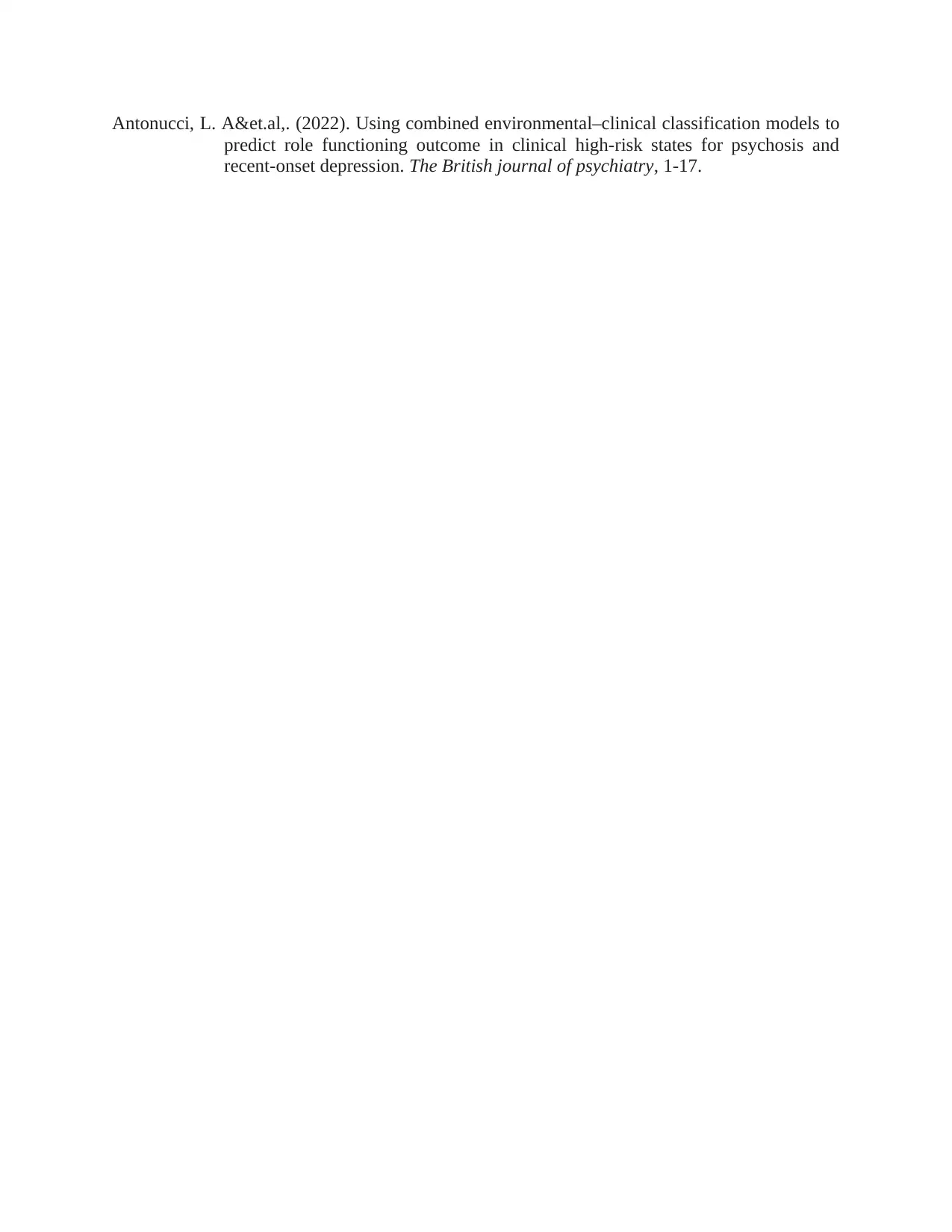
Antonucci, L. A&et.al,. (2022). Using combined environmental–clinical classification models to
predict role functioning outcome in clinical high-risk states for psychosis and
recent-onset depression. The British journal of psychiatry, 1-17.
predict role functioning outcome in clinical high-risk states for psychosis and
recent-onset depression. The British journal of psychiatry, 1-17.
1 out of 10
Related Documents
Your All-in-One AI-Powered Toolkit for Academic Success.
+13062052269
info@desklib.com
Available 24*7 on WhatsApp / Email
![[object Object]](/_next/static/media/star-bottom.7253800d.svg)
Unlock your academic potential
Copyright © 2020–2026 A2Z Services. All Rights Reserved. Developed and managed by ZUCOL.





